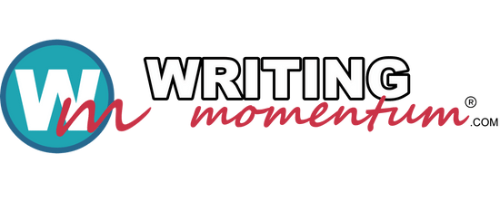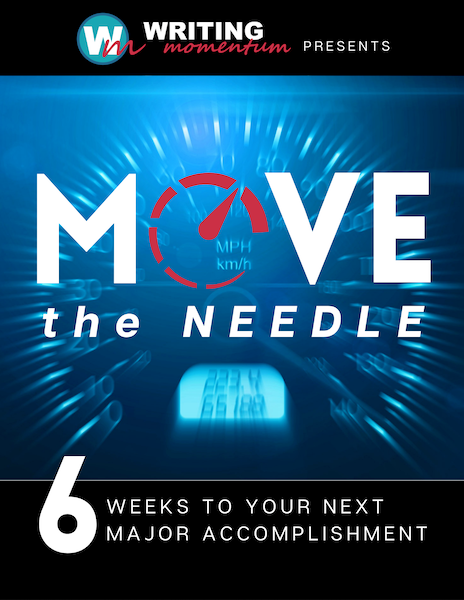Episode 138
Tips for a Healthy Brainstorming Session
In this episode of the Writing Momentum podcast, hosts Gena and Christopher Maselli discuss how to conduct a healthy brainstorming session. They are joined by Rene Gutteridge, who shares her approach to brainstorming for her books, stories, and screenplays. The conversation touches on techniques such as:
- asking 'what if' questions,
- the 'yes and' approach
- the importance of creating a positive, collaborative environment.
They also explore how brainstorming can apply to both fiction and nonfiction writing and the value of feedback from diverse groups, including family members and writing communities.
- 00:00 Introduction and Hosts Introduction
- 00:27 Special Guest Introduction: Rene Gutteridge
- 01:01 Topic Introduction: Healthy Brainstorming Sessions
- 01:47 Brainstorming Techniques and Personal Insights
- 04:11 Collaborative Brainstorming in Writer's Rooms
- 07:12 Creating a Positive Brainstorming Environment
- 10:39 Brainstorming Beyond Professional Settings
- 15:59 Techniques for Effective Brainstorming
- 18:02 Creating Problems for Characters
- 21:54 Conclusion and Community Invitation
LINKS:
- Liz Wilcox's Email Marketing Membership at http://wmdeal.com/liz
- Get your FREE Move the Needle goal-setting for authors ebook at https://www.writingmomentum.com
- Write with us! Join our writing membership and get your book DONE! https://wmdeal.com/wmmrene
Transcript
How do you have a healthy brainstorming session?
Christopher:We can help with that.
Gena:Hi and welcome to the Writing Momentum podcast.
Gena:I'm Gena Maselli.
Gena:I'm here with my husband, Christopher Maselli.
Christopher:Oh, there was a pause like you forgot.
Gena:No, I was trying to figure out whether or not I was going
Gena:to say Chris or Christopher.
Christopher:Oh, okay.
Christopher:Well, I'm, you can go either way.
Christopher:I'm glad to be here.
Christopher:Oh, hey, but there's someone else in the room today.
Gena:There's somebody else here.
Gena:One of our favorite people.
Christopher:Rene Gutteridge.
Christopher:Welcome Rene.
Christopher:How are you doing today?
Rene:I'm doing good.
Rene:How about you guys?
Christopher:We're doing great because we're sitting here talking with
Christopher:you about writing and that always gets us fired up and charged up.
Christopher:And I, I, I'm like, we just recorded another podcast and I'm all ready to
Christopher:sit down and start writing, but I can't because now we're having to do this.
Gena:I know if you missed it last week's podcast was what to do when you're stuck.
Gena:So definitely check that out, if you missed that.
Christopher:What's this week's podcast?
Gena:Today we are talking about how to have healthy brainstorming sessions.
Christopher:Brainstorming, like, like trying to figure out what your
Christopher:book is about or your story is about.
Christopher:Is that what you mean?
Gena:Well, you could do stories.
Gena:You could do what to do with a character who's in a certain predicament.
Gena:You can do some kind of conflict.
Gena:There's also, you know, there's so many elements, so many points in a
Gena:story that need to be, um, um, that need to be explored and figured out.
Christopher:So often what we do is we run into a problem and we're thinking,
Christopher:okay, what do I want to have happen next?
Christopher:And the first thing that comes to mind, we run with that and just start doing that.
Christopher:And that's okay.
Christopher:But could there be a better way?
Christopher:That's the question.
Christopher:So Rene, do you always brainstorm your books?
Christopher:Your stories, your characters, how much brainstorming do you do?
Christopher:Is it every facet of a book?
Christopher:Do you have a notebook, one of those thick notebooks where you start to
Christopher:write down all the stuff about them all?
Christopher:What do you do?
Rene:Yeah, I, so, I mean, just, Me personally, I spend a lot of
Rene:time thinking about and writing down things about the character.
Rene:Um, normally not their background, normally not their life history.
Rene:It's, it's more about the essence of them, um, who they are and, uh,
Rene:all the other things can be made up.
Rene:But I've got to explore, you know, what I'm dealing with in the soul and spirit
Rene:of the person before I set them anywhere and give them a mom and dad and all that.
Christopher:I already want to explore that more, even though that's probably
Christopher:another podcast, but you know, most people, when they think about writing
Christopher:character histories, they do just that.
Christopher:They say, okay, they're going to have blue eyes and this is the length of their hair.
Christopher:And this is where they grew up and they start to get to all
Christopher:those very concrete things.
Christopher:Things, and they don't explore the characters, uh, motivations necessarily.
Christopher:Um, so that's interesting.
Christopher:Maybe that's another podcast we do, but that's an interesting, uh,
Christopher:interesting take you have on that.
Rene:Yeah, I'll drive around the city and think about these
Rene:characters for months, you know.
Rene:Yeah, I mean, it all starts with the characters.
Christopher:Are you brainstorming?
Rene:Mm hmm.
Rene:Yeah, um, and I, you know, I get to know them, uh, I don't want to write
Rene:about them if I don't know them, and, and I believe that the characters should
Rene:drive the story, not the story of the characters, so I want to make sure that
Rene:I understand how deeply I need to wound this man before he learns his lesson.
Rene:Right?
Christopher:We're still talking about the stories, right?
Rene:Yeah, not my husband, just my fictional characters.
Rene:Um, but yeah, so, but I also enjoy, you know, as I've gotten into, um,
Rene:the screenwriting world, which I've been working in, well, for many, many
Rene:years, but full time for 10 years now.
Rene:There's a lot more brainstorming required with groups.
Rene:And, uh, you get into what we call the writer's room and, you know, you're taking
Rene:notes and you're taking other people's ideas and you're, you're having to grab
Rene:things, you know, from the air of what people are tossing out and then figuring
Rene:out what can work in the actual story.
Rene:So, um, yeah, there, I've learned, even though I started off as a novelist, I've
Rene:learned to appreciate collaborative, creative work and collaborative
Rene:brainstorming with writer friends.
Rene:So yeah.
Christopher:Walk us through a creative brainstorming session.
Christopher:You and several people that you work with are going to get together, you're going
Christopher:to brainstorm a skit or a story, whatever.
Christopher:How does that session, how does it work?
Christopher:Uh, other than after everyone brings the doughnuts.
Rene:Yes, everybody brings the virtual donuts because we almost
Rene:always do it on zoom these days.
Rene:Although we've done that in person, and it's a lot better in person.
Rene:If you have a choice, do it in person, because you, because what you don't get
Rene:over Zoom is the energy in the room.
Rene:Um, if you can do it in person, there's a lot more energy in the room.
Rene:You can read people's body language.
Rene:So what I do, you know, as a screenwriter, my job isn't always to come up with the
Rene:idea, it's often to take the idea that's been decided on and run with that idea.
Rene:So, what I'm watching for in the writer's room is, Um, certain energy levels
Rene:popping up when an idea is thrown out.
Rene:You know, you can, you can hear there's deathly silence, you know, which
Rene:I've thrown out many ideas that, you know, there's like crickets, um, or,
Rene:you know, you're watching people go.
Rene:Oh, yeah.
Rene:And the same can be applied when you're brainstorming with
Rene:friends, you know, see what.
Rene:Everybody goes, Oh, oh, yeah, you know, and at first you might
Rene:not think it's going to work.
Rene:You're like, it's never going to work.
Rene:Like, for example, the, in this last big writing room session I did
Rene:for this screenplay we're working on, the idea was thrown out to set
Rene:it in the 1930s and everybody in the room was like, oh, my gosh.
Rene:I was like, no, no, no, no, no, no, no, no.
Rene:I mean, internally, I was just like.
Rene:I can't no, this is a bad idea.
Rene:Turned out to be a great idea.
Rene:Let myself sit on it for a while.
Rene:I was thinking more from a work standpoint of how am I going to
Christopher:do all the research for that
Rene:Yeah.
Gena:My mind went straight to what would that take cost wise to
Gena:create the set for something that's set in a whole nother time period.
Rene:Yeah, well, those are the things, yeah, that you're, and, and, but the,
Rene:the key to working with a creative team is to keep the positive energy going.
Rene:So.
Rene:You want to invite ideas, not reject ideas or get defensive.
Rene:That's how, that's a big lesson I've learned over the last 10 years is
Rene:bringing a negative energy will just kill a writing room just so quick.
Rene:Um, you want everybody to feel safe throwing out ideas,
Rene:um, including yourself.
Rene:And then you start to, um, What's the word?
Rene:Parcel it out and figure, figure out what you can use, what you could modify.
Rene:I mean, there's, there's several categories.
Rene:What can I use?
Rene:What can I modify?
Rene:What can I steal from?
Rene:You know, I don't like that big idea, but I love that little piece in that big idea.
Rene:And I'm going to take that, um, thing, you know, So just let, let it all absorb
Rene:instead of trying to make decisions on the spot about what can and can't be used.
Christopher:So when you say negative energy, you don't just mean bad ideas,
Christopher:you mean, what do you mean by that?
Christopher:Explain what you mean by negative energy.
Christopher:Yes.
Rene:Negative energy is, can go two ways.
Rene:It's first of all, creating a safe environment for everybody.
Rene:It's also, keeping yourself from being on a defensive posture.
Rene:Um, you know, for example, I might throw out an idea, and nobody catches
Rene:the idea, like, there's crickets in the room, nothing's happening, and I
Rene:might feel like I need to re explain, oh, they just didn't get it, right?
Rene:Let me say this another way.
Rene:It's normally not that.
Rene:It's just that the idea didn't click in the moment.
Rene:Now, I might still use the idea.
Rene:But I have to say to myself, why didn't that idea click in the room, you know?
Rene:Uh, why, why didn't, I thought it was a great idea.
Rene:Why is nobody loving this idea?
Rene:And I have to really, really pay attention to that.
Rene:Because, you know, at the end of the day, everything that we're writing,
Rene:uh, in, whether it's fiction or screenplays, is commercial, right?
Rene:We're writing to sell to readers.
Rene:So how do we make sure that this is something that the masses will like?
Rene:Um, or, the other thing I think of is, The masses don't like
Rene:this, how can I change it?
Rene:So they will.
Rene:But either way, that first impression of your idea should be paid attention to.
Rene:If everybody throws up their arms and goes, that's it, you know,
Rene:don't be the one that's like, eh, I changed my mind on that.
Rene:I mean, you know, you it's, there was something there that
Rene:caught everybody's attention.
Rene:So, but yeah, you just wanted to create a rich, fun environment for brainstorming
Rene:that's sort of free from, um, Oh, too much, Oh, what's the word I'm looking for?
Rene:Like, um, analysis in the moment, you know, or critique in the moment.
Gena:Yeah.
Gena:And I think also, as you're talking, you're talking about a writer room, but
Gena:this happens just as we're brainstorming for our books, and it can even be, I,
Gena:I, I mean, a lot of this is, is fiction because we're saying, you know, what
Gena:happens with this character or how can I make the, how can I kill this person
Gena:off or whatever it might be, but it can also, even in, uh, nonfiction, you can
Gena:brainstorm with the, well, what are some reasons for this, or what is some outcomes
Gena:for this, or, How can I communicate that?
Gena:So this does also work for nonfiction.
Gena:I want to point that out, but also when we're talking about, we're not
Gena:just talking about a writer room there.
Gena:It can be in writers groups, but it can even be within our own
Gena:families as we're, as writers.
Gena:I know Chris and I have sometimes opened this up to our, our teenagers
Gena:to say, well, what about this?
Gena:And they will take it in a whole different direction that we didn't think of.
Gena:This actually really creative and could be a whole different
Gena:direction for, for the story that would have just passed us right by.
Christopher:Yeah, they've just got a creative energy about them.
Christopher:Their, their youth does, I think, right?
Rene:Their youth does too.
Gena:You know, I might not first think of maybe some of the more modern, you
Gena:know, text messaging apps or whatever that they kind of live on, you know,
Gena:with their friends or even some of their, you know, Fun, fun things
Gena:they might go do with their friends that they would, that we wouldn't, we
Gena:wouldn't do that as much, you know?
Gena:So anyway, I just want to make sure that like, as we're talking, people understand
Gena:that we're not just talking, you know, brainstorming can happen any place.
Gena:It doesn't just happen among, just among professionals.
Gena:It can happen, um, in really casual, fun environments.
Rene:It's also helpful when speaking with adult children, the language that you
Rene:use, you know, you throw out those what if ideas, you know, not, you should get
Rene:health insurance, but what if you didn't have health insurance, what would happen?
Rene:You know, those, those positive words, like, what if he was a police officer?
Rene:You know, what, the what if questions, um, if you're providing feedback more
Rene:than oh, you should make him a police officer, that feels very like intrusive
Rene:to somebody's creative space, so you're, you're using language that allows for
Rene:more input, more fun, you know, what if he's this, what if he's that, I mean,
Rene:that's the question we all start off with in our books, you know, what if,
Rene:There was, you know, um, even nonfiction.
Rene:What if we explored this topic under this umbrella, you know, or whatever?
Rene:So, um, but I do find also that now, not so much with myself, I'm allowed
Rene:to interrupt myself, but, um, you're brainstorming with yourself and
Rene:brainstorming with people, but when you get a chance to have people's ear, right?
Rene:The people have come around you to help you with the book, whether it's
Rene:your kids, whether it's your critique group, uh, whether it's just friends,
Rene:allow them to speak more than you talk.
Rene:Give them the room, so to speak.
Rene:Um, you know, this is explain things as you need to, but if,
Rene:if you don't need to, don't.
Rene:So, like, when I'm brainstorming with friends, I'll throw out the premise of
Rene:the book, the problem I'm trying to solve.
Rene:And then, um, maybe somebody throws something out, you know, good idea, but
Rene:I know it won't work instead of saying.
Rene:That doesn't work.
Rene:I would say, okay, what if he was a police officer.
Rene:But he's in, you know.
Rene:he's got this issue, you know, he has PTSD or whatever, you know, cause that's
Rene:the, so you're leading the discussion without controlling the discussion.
Rene:Um, you know, and just letting everybody have the floor, but you.
Rene:That's the hardest part, because we want to explain our story and get it out there
Rene:and tell the whole thing, but let's say you only have 60 minutes, if you've spent
Rene:40 of it talking, then you may miss an idea that somebody has, because there
Rene:wasn't room for it to grow and blossom and, you know, that kind of thing.
Gena:You mentioned before, uh, that you may hear an idea from somebody and maybe
Gena:in your mind you're thinking, Well, that whole idea won't work, but I really like
Gena:this little nugget that they had on there.
Gena:This little glimmer of gold that I can, I can take that.
Gena:And if you are interrupting or shutting it down, you may not get to the glimmer.
Gena:You may not get to the little piece of gold that's in it.
Gena:So yeah.
Christopher:There's two techniques we've talked about here that I think we
Christopher:should, reiterate a little bit because they're really powerful techniques,
Christopher:whether you're brainstorming with a group or whether you're brainstorming
Christopher:just with yourself and a piece of paper.
Christopher:And often when I'm plotting out a novel, I like to just have a
Christopher:piece of paper in front of me.
Christopher:And one of those is this what if question.
Christopher:Ask what if this or that could happen?
Christopher:Okay.
Christopher:I know my main character is going to be a photographer.
Christopher:What if they're a photographer for the school paper?
Christopher:Right?
Christopher:What, what if they're a photographer of families?
Christopher:What if, when they take a picture, the person disappears?
Christopher:Right?
Christopher:You start to make the novel more interesting, and just asking those
Christopher:questions, it doesn't mean you have to go with one of those, but getting
Christopher:all those down on paper kind of gets them out of your mind, and lets you see
Christopher:kind of where there might be a golden thread there that you can follow.
Christopher:But the other one that you talked about just a second ago, Rene,
Christopher:was this idea of yes and, right?
Christopher:So someone has an idea or you yourself have an idea and instead of just shutting
Christopher:it down and saying, no, that won't work.
Christopher:It's yes.
Christopher:And what if we did this too, right?
Christopher:Yes.
Christopher:They're a photographer.
Christopher:And what if, they're working with a school paper.
Christopher:Yes.
Christopher:And what if they take a picture of their best friend and, you know, and you,
Christopher:and you start to go down that route and you can find some very interesting
Christopher:thoughts that you would have never come about had you not had that kind
Christopher:of openness to just brainstorming the what if and the yes and questions.
Rene:Yeah.
Rene:That's good.
Rene:The yes, and is so important, um, in the creative world.
Rene:And, uh, I, I think we don't do that enough, really, even in our life.
Rene:It's a really nice personality trait to be a yes and person,
Rene:um, more fun to be around.
Rene:Right?
Rene:Um, so, yeah, and I was going to mention too, when you're personally brainstorming,
Rene:and this is going to apply to fiction, um, but one of the things that.
Rene:You want to push yourself in when it's just you is creating problems.
Rene:So, you know,
Christopher:I was trying to solve problems, not create them.
Rene:Right.
Rene:You're trying to solve problems in life.
Rene:But in, right.
Rene:And in fiction, you're trying to create problems.
Rene:So when you were saying, you know, even you just gave a great example of it.
Rene:You were, you know, saying, okay, he's a photographer.
Rene:He's a photographer for the school paper.
Rene:What if he takes a picture and that person disappears?
Rene:You know, like you're, you want to create as many problems.
Rene:And headaches for your character as possible.
Rene:So, you know, we've, Gena and I've talked about this a lot.
Rene:Most of us are fine, decent people who are not trying to wreak havoc on other people.
Rene:So we find it hard to wreak havoc on our characters.
Rene:Um, but that's what you want.
Rene:So, in a brainstorming session, you know, if you say something you can guide the
Rene:you know, guide the whole conversation with, I need to make his life harder.
Rene:You know, sometimes if you're throwing out too broad of a question, this
Rene:goes for just yourself and a group.
Rene:If you're throwing out too broad of a question, you can just
Rene:go get, go all over the place.
Rene:So if you'll guide the brainstorming a little bit and say, okay, I've got
Rene:this character, he's a police officer, he's this, he's a photographer, he's
Rene:this, and I need to create as many problems for him in his life as possible.
Rene:Personally, internally, externally.
Rene:Or you might just start even smaller.
Rene:Internally, what are his personal issues, you know?
Rene:Okay, let's move externally.
Rene:What can I do to make those internal problems worse?
Rene:And, you know, then everybody sees what a masochist we all are in fiction writing,
Rene:because we're just creating, you know.
Christopher:And they all become very, they become entertaining
Christopher:is what they become, right?
Christopher:All those problems start to become this entertainment because we love to watch
Christopher:people try to get out of their problems.
Gena:Well, and I would even challenge, and I'm working on this myself,
Gena:having your character choose wrongly.
Gena:Having them, not just as you've said, Rene, having the problems happen
Gena:to them, but have them be the one that's causing their own problem.
Gena:They're choosing wrongly.
Gena:I mean, it's kind of that thing where all of us have done that, where we've watched
Christopher:No, I do that all the time.
Gena:Where we watch it, you know, we watch a TV show and, and, or a movie or
Gena:something, and we're wanting to scream at the, at the screen because the, the
Gena:person is making the wrong decision and we know that it's the wrong decision.
Gena:And we just.
Gena:You know, there's that fine balance of not irritating the audience too much
Gena:with their bad decisions, but there are, there does have to be that point.
Gena:And I know Rene's challenged me with that of how can you make it where
Gena:you're just your person chooses wrongly.
Gena:And builds that conflict for themselves.
Gena:Like, they're, they're their own worst enemy in some things.
Gena:Not all the time, but they, you know, we all do that.
Gena:At least I do, right?
Christopher:Yeah.
Christopher:Well, this has been another great discussion.
Christopher:Always enjoy having you on, Rene, and, and, you know, if you're, if you're
Christopher:looking for a writing community, Rene and Gena and I all have a
Christopher:writing community at writingmomentum.
Christopher:com.
Christopher:You can go there.
Christopher:We have a membership.
Christopher:It's very low cost, very affordable.
Christopher:It's just 25 a month, and in that you'll receive hundreds of hours
Christopher:of video about training on how to write, how to get published, how to
Christopher:market your book, that sort of thing.
Christopher:But we've also got weekly co working sessions.
Christopher:We have roundtables where we discuss things like what
Christopher:we're talking about today.
Christopher:But you can discuss it with us and not just listen.
Christopher:We've also got critique sessions where you can submit a page of your
Christopher:manuscript and just get some professional feedback from award winning authors.
Christopher:And it's all good stuff.
Christopher:It's very low cost because we just love building this community and we'd love
Christopher:to have you there at writingmomentum.
Christopher:com
Gena:Well, thank you so much for joining us today.
Gena:Thank you, Rene.
Gena:We love having you on here.
Gena:It's so cool.
Rene:Thank you guys.
Rene:Appreciate you.
Gena:And we're so thankful for all of the people who are listening or
Gena:watching, and we hope that you will check us out again next week, because
Gena:we do believe strongly, absolutely, that this writing thing is not to be
Gena:done alone, but that together, Chris?
Christopher:Hey, we have writing momentum.
Gena:That's right.
Christopher:Bye.
Christopher:Bye.





